11.15
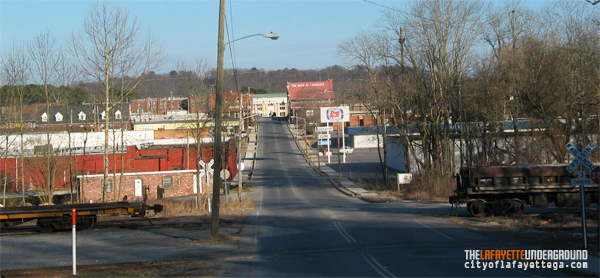
Ignoring fervent pleas from tax-paying citizens, the LaFayette City Council voted during its October meeting to raise the price city utility customers pay for water and electricity.
Walker County Messenger, 10/13/2010:
- “The LaFayette City Council voted Monday evening, Oct. 11, to raise city utility rates a small, but controversial amount. Council members pointed out that utility rates in the city have not been raised for approximately 10 years, and that factors beyond their control were now forcing their hand. ‘I know we don’t want to do an increase, but we have to,’ mayor Neal Florence said.”
Those cited “factors beyond their control” are actually a direct result of decisions the council made a year or more ago. As you’ll see below, the rate increase could have been avoided entirely if LaFayette’s leaders had been keeping the city’s best interests in mind from the very beginning instead of just taking care of their own interests and pet projects.
The first utility discussed was water. According to the mayor and council, water and sewer rates must rise by one dollar “per mill” (approximately 3,000 gallons) in order for the city to qualify for a state loan. The $600,000 loan will be used for badly needed upgrades at the sewage treatment plant. Current revenues are high enough to cover anticipated loan payments, but the state agency administering the loan isn’t comfortable with the price currently being charged for water and is forcing LaFayette to raise rates so there’s no risk of a default.
As discussed in September’s meeting notes, maintaining and improving the sewage treatment plant is good for the city and necessary to stay compliant with environmental laws. But blaming water and sewer price increases on an “unfunded mandate” isn’t exactly fair since the city would have plenty of cash on hand to upgrade sewage treatment without a state loan if all LaFayette’s SPLOST funds hadn’t been blown on a $900,000 softball complex nobody asked for.
That softball project, an unnecessary pet project of councilman Norm Hodge, was originally supposed to cost $170,000 and be completed in April 2010. As of today the field is unfinished and construction halted because the city burned nearly a million dollars and “ran out of money” before it was done. As a result, any possible (however unlikely) economic benefit generated by that complex won’t be seen for another year or longer, but the economic cost of its construction are impacting city utility customers today.
Councilman Andy Arnold correctly stated “there comes a time when you have to deal with infrastructure .. We have to get it done.” Which is so very true. But infrastructure like sewage treatment, sidewalks, and streets should have been dealt with before building non-infrastructure toys with SPLOST tax revenues originally promoted to voters as an investment in local infrastructure.
After brief discussion – in which councilmen noted the increased rate would still be less than what Walker County charges for water – city water rates were increased in a unanimous vote. The measure also changed sewage billing; previously water customers paid 75% of the water rate for sewer service, but the council raised that amount to an 80% match.
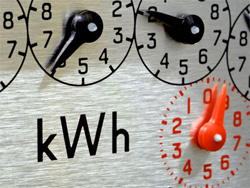 Next the city moved to a proposed increase in electric rates. Initially the council provided no reason for increasing electric bills, just vaguely referring to “increased costs” over a “long period of time.” A representative from MEAG Power, the city’s electrical provider, was present at the meeting, but he said little outside of thanking the council for continuing to do business with his employer and left before the meeting’s end.
Next the city moved to a proposed increase in electric rates. Initially the council provided no reason for increasing electric bills, just vaguely referring to “increased costs” over a “long period of time.” A representative from MEAG Power, the city’s electrical provider, was present at the meeting, but he said little outside of thanking the council for continuing to do business with his employer and left before the meeting’s end.
According to the council, standard summer (June-September) residential electric rates are 7.7 cents per kilowatt hour (KwH), with winter rates two tenths of a cent higher. Their proposed increase would raise both by a tenth of a cent to 7.8 and 8 cents per kWh respectively – slightly more than 1%. Commercial rates, which weren’t listed during the meeting, will also go up by the same amount, increasing economic pressure on the city’s few remaining industrial employers.
Our earlier article about the proposed utility rate increase quoted a rate of 9.399 cents per kWh. That obviously doesn’t match rates provided by the council. Underground figures were based on a single residential utility bill; breaking down two other recent bills shows a rate that varies anywhere from 8.015 cents to 8.391, plus the 9.339 cents originally calculated.
All those rates were figured by dividing the amount of money charged by the amount of power consumed, so either the city doesn’t actually charge what it claims to charge, or there’s some kind of hidden tax or fee buried within the total charge that isn’t broken down in the bill. For the sake of clarity and error checking, the city should provide utility customers with a more transparent bill that accurately lists every part of what’s being paid, including the current rate of each service. Utility customers currently have no way to check if they’re being billed correctly, and some might not be – but a simple examination of their bill wouldn’t make that fact obvious.
According to the council, rate increases for water and electricity are both justifiable because they’ve been the same price for a decade. While that might be true in essence, a broader view shows utility customers have endured several cost spikes during the last year. LaFayette recently added new fees for utility customers who pay with credit or debit cards, put a flat $2 charge on every bill to cover “state mandated maintenance costs” they weren’t willing to absorb, and ceased sending final notice mailings to customers who haven’t paid their bills. The city has also limited “arrangements” for delinquent accounts to once per year – meaning customers with seasonal jobs or temporary unemployment will face utility cut-offs if they get behind more than once in a 12-month period. All those changes add up to additional hardship for families already battling a difficult economy, hardships made worse by increased utility rates.
LaFayette’s council obviously doesn’t see the rate increase as much or a hardship, saying the typical family will only pay a few extra dollars per month – but not every family is typical, and many will pay more. Just a few extra dollars per month quickly add up to real money – $60 a year is significant for many LaFayette families. But even a dollar a year is too much to pay when the reason behind it comes down to the city council’s backwards and self-centered priorities in how they spend LaFayette’s money.
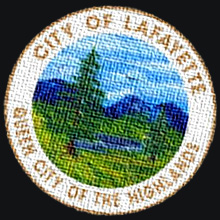 Councilmen revealed a deeper constituent disconnect with jokes about needing to hurry home to fill swimming pools before the rate increase starts, during a time when many can’t even afford the city pool anymore, much less their own.
Councilmen revealed a deeper constituent disconnect with jokes about needing to hurry home to fill swimming pools before the rate increase starts, during a time when many can’t even afford the city pool anymore, much less their own.
As usual, no opportunity for questions or comments was extended to the small crowd of observers. But one older lady we’ve dubbed Brave Citizen stood and interrupted the council’s mumbled debate, asking the men to justify their decision to raise electrical bills in the midst of a recession.
Her simple question “Why is this necessary?” produced an almost tangible tension in the room, a tension only heightened when Brave asked the council to detail any cost cutting measures they had taken to avoid the rate increase. After a brief tense pause, one councilman blamed the increase on higher prices from MEAG, the city’s bulk energy provider, adding that “we cut everything we can.”
That answer didn’t satisfy the crowd. Brave Citizen again asked the council if their airport makes money. They replied that it doesn’t, but said the airport should be looked at just like the garbage department which also loses money year after year. One councilman claimed the city isn’t allowed to raise the rates charged to pilots who use the airfield, but cited no rule or regulation that would prevent them from doing so.
Unimpressed, Ms. Citizen went on to ask if LaFayette Golf Course ever makes money. The answer, again, was no, with another defense: many in the community play golf there. That prompted Brave Citizen to comment (quite accurately) that 100% of the city’s residents use water and electricity, but 90% don’t use the golf course.
By that point the council was shifted into a defensive position. LaFayette’s esteemed leaders began throwing out comments about cost cuts at the golf course making it profitable soon, promising a “turnaround” that would lead the course to make money after years of losses. They also cited the many “big tournaments” held there each year that draw people in to town. (Councilman Hodge once promised similarly invisible tournaments for the new softball fields.)
Councilman Wayne Swanson defended the course’s red-ink operation by saying avid golfer and attorney Fred Henry, now deceased, credited the golf course with Roper’s decision to locate a factory in LaFayette some forty years ago. “It’s here to bring industry in” he said – a statement Brave Citizen rebutted with “it’s not working, we’re losing them.”
Trying to shift focus from the golf course and airport, the council claimed the library and rec department have changed their operating schedules to save money and the city is down to only 132 employees. They also attempted to confuse by claiming the golf course is part of the recreation department, even though its management, budget, and accounting are kept distinctively separate.
Brave Citizen wasn’t distracted long, asking the council why they chose to pave Gasque Dr. at the airport and golf course (a road that was in relatively good condition) while most of the city’s thoroughfares look like the streets of bombed-out Beirut. That really threw the council for a loop and produced a conflicting answer: one councilman said the state chooses which roads get paved and buys the city’s asphalt, and another corrected him by noting the city actually provides a list of streets that need paving and the state gets to pick which to pave. None of the leaders could provide a reason for Gasque Dr. being on that list in the first place, nor did they mention any of the other streets in town (if any) that were included on the list.
Again the council was asked to raise hangar fees or fuel prices at the airport to offset losses there instead of passing them along to utility customers. This time, instead of saying they cannot, the council said doing so would be unfair to “people in this city who pay taxes and also use the airport.” Councilman Eric Tallent then took the lead, saying “not a lot, but some” residents want the airport and golf course – a defense that wasn’t very helpful.
- “I don’t understand why you don’t care. .. How do you people expect people on social security or unemployment to survive?” -Brave Citizen
Brave Citizen expressed frustration at the council’s obvious lack of concern for city residents, then put Tallent in the hot seat by asking if he gets a free pass to the golf course. He confirmed that he does play for free, but defended his free games by saying cart rental isn’t free and joking how he more than makes up for not paying by eating at the course’s underpriced snack bar – something he’d likely do even if he did pay to play.
Increasingly productive questions from Brave Citizen inspired others to speak up. A gentleman in the crowd expressed his agreement for the comments already made and adding that raising utility rates is the same as raising taxes on everyone who uses city utilities. That prompted mayor Neal Florence to break out his best Marie Antoinette impersonation in saying the tax increase comparison isn’t fair because “only those that use the water pay for it.”
Additional complaints about fixed-income residents suffering most (no raise for Social Security again this year) and the rising cost of groceries and insurance landed on deaf ears. Councilmen noted, in a weak defense, how their own paychecks (presumably from their non-city jobs) have also gone down. The mayor then wrapped up debate with another of the disconnected and demeaning comments he’s become known for: “this isn’t as bad as in the ’30s.”
The council then passed the electrical rate increase by a vote of four to one, with Wayne Swanson (up for reelection next November) in opposition.
In other business, the council discussed their findings in regards to employee healthcare. During September’s meeting several councilmen had been frustrated with the high cost of health coverage and questioned if the city’s current plan was the most economical option. Councilman Bill Craig, in order to “make everybody feel good [that] we done all we can” talked to one additional insurance provider, Blue Cross Blue Shield. BCBS quoted a price higher than what the city currently pays so Craig declared the matter dead without further investigation.
City Council approved $59,152 for the gas department to purchase a new backhoe. Funding was part of the previous year’s budget but wasn’t spent because no bids were received. Councilmen clarified this backhoe will belong to the gas department but be available for any other department to borrow as needed – this was probably said for the benefit of LU blog readers since we complained before about mowers being segregated by department.
The council next voted to approve the state loan for sewage treatment upgrades; amended the 2010 budget to reflect loans, grants, and FEMA funds made available for Public Safety; closed the financial books for fiscal year 2010 (which ended in October); argued for a few minutes about what day to hold “official” trick-or-treating (no final decision was reached); and set the vague theme and date for this year’s Christmas Parade (“Magical Christmas” on December 3rd).
One of the biggest areas of disagreement in the meeting was over the Amazing Light Show at Joe Stock Park. Parks & Recreation director Patti Scott asked for permission to sell advertising during breaks in the show’s music. Advertising was part of the show’s first year in 2008 then dropped in 2009 due to complaints, but Scott wants to sell ads again in order to raise money and offset some of the show’s electric bill. Councilmen Bill Craig and Andy Arnold opposed the idea because advertising is tacky (which is true, but the entire thing is tacky), with Norm Hodge and Eric Tallent in favor of ad sales. Wayne Swanson refused to take a side, forcing Mayor Florence to break the tie by voting in favor of advertising.
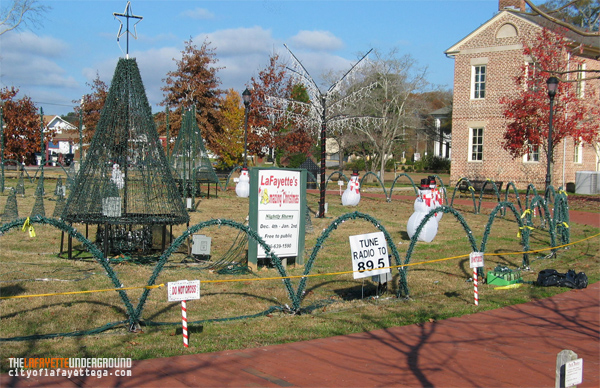
That vote didn’t end debate, and Scott asked if advertising could include political spots. Mayor Florence suggested ads only consist of a name and holiday greeting from the advertiser, a plan with more appeal to the council. A second vote to allow advertising in the form of only greetings was approved in a 3-2 vote, with Andy Arnold and Bill Craig maintaining their opposition. Council also agreed not to allow lights on the side of Chattooga Academy this year, since doing so would (according to Bill Craig) be morally equivalent to putting an advertisement on the side of a church.
It was good to see the council disagree on something, for once, and the initial tied vote shows perhaps the councilmen aren’t as unified as they try to appear. However, with that said, it’s shameful that they spent so much time arguing about a relatively silly issue like Christmas light advertising (which might slightly annoy dozens) a few minutes after an electrical rate increase (which seriously impacts thousands) passed with minimal debate.
Council wrapped up the meeting by appointing Kevin Ginny (?) to the city airport committee, replacing Bob Jones who resigned. That’s the second airport board resignation in two months, possibly indicating some over there are opposed to Dr. Paul Shaw’s plans to build a new terminal. Still no idea how many people serve on the committee, but we know its members now include Dr. Shaw, Councilman Swanson, Darryl White, and Kevin Ginny.
We apologize for the long delay in getting this article posted. Notes and commentary from the November meeting are coming soon. Thanks to the Underground note taker and to Brave Citizen for standing up to ask the questions so many have been wanting to voice. We encourage every citizen of LaFayette to attend at least one council meeting; the next will be on Monday December 13th at 7:30 PM.







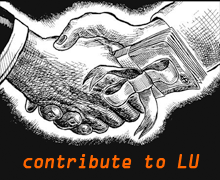



Go brave citizen!!!
Also note that raising water and electrical rates doesn’t just impact city residents. Anybody in Naomi, Noble, out towards Shinbone Ridge.. LaFayette has utility customers well beyond the city limits.
Also, again, want to encourage everyone to start attending these meetings. Even if you don’t want to speak up, it’s a lot easier for others to speak up when they know they have friends or supporters in the room.
Thanks for reading.
— The LaFayette Underground
This entire article is mind blowing. I, for one, and probably like so many others, had ZERO clue that the city council was *SO* ignorant and self serving. I guess it just takes one person to say something to make others stop and truly look at what’s going on.
I think it’s time we did something about what’s sitting in those chairs. Clearly, they do NOT have the betterment of the community as their best interests, and have gone unchecked for far too long. I feel so ashamed for blindly having faith in the people that run the city. Isn’t that a sad statement? It’s so very true.
THANK YOU for posting this, and thank you to the good person who asked tough and necessary questions. Next meeting I’ll be there. Hopefully others will come too.
LaFayette City Council brought to you by Dewy, Cheathem, and Howe.
Hey Tommy, don’t forget about their young associate, Robin Rapestein. You can’t miss him. He wears those little-bitty round glasses and looks constipated all the time….
I have listened to many complaints about the city council thinking the ones complaining had personal issues with them. This new ball field consuming hundreds of thousands of dollars has opened my eyes and makes me wonder about our leaders and their financial habits that are affecting us today. The way our local government is being run is not very different from our federal system and both are destined to fail on current paths. We as a society must learn the most efficient way of conducting business while living within our means. It is obvious our leaders are more interested in themselves than our best interests. Each citizen that votes places trust in these officials to handle the city’s business better than they would their own. Its not happening now, nor in the past few years. I will vote to reflect my observations. Thank you Lafayette Underground for keeping all the people informed
It’s obvious that our city Fathers care nothing about the residents of LaFayette. They only care about themselves which is very sad. We must stand together and vote these people out of office and put people in office that care about LaFayette. Get rid of the “good old boy” attitude. Let’s make our voices heard!
One concerned resident
does anyone have any information on how to go about running for city council…..the more and more i hear about the crap our council does the more agrivated i get. I have never been in politics but i’m a young tax paying citizen who works for a living and i have a clear understanding of what this city needs to do in order to get back on track…im a christian, im not a drunk, i dont believe in kickbacks, i dont like womens softball, and I DANG SURE DONT LIKE GOLF!!!! what i like are nice clean well maintained streets, respect for the tax paying members of the city, having something to do for fun and not driving half the day to get there, safe clean places for kids to play, and updated equipment for the city workers instead of the wore out junk they are used to using, and thats just to name a few….hit me up with some info
Qualification for next November’s city election will be during July. Not sure long long the window is, but it’s short – and they don’t advertise it very far ahead or very loudly. You have to live within the city limits and must live in the same ward as the person you plan to run against. Next year Eric Tallent (ward 4), Bill Craig (Ward 3), and Waynce Swanson (at large/entire city) are up for a vote. Someone has already declared their intentions to run against Swanson, so if you also go against him you’ll just divide up the oppositional vote and give the race to him.. I don’t know for sure what the city policy is about run-offs.
If you need more info or want some specific advice about you personally, e-mail us at lu@cityoflafayettega.com
— The LaFayette Underground
i would run in ward 3
I just recently got turned on to this website from a friend of mine and I am glad to see that my word of mouth complaints and proposed revisions are not the only way things are being broadcast to try and better our town. Thank you for keeping everyone up-to-date in ways I never could.
i was told today that dr shaw will run for neal’s job
jc: Per my understanding he’s going to take a shot at Bebe Heiskell’s job first. She’s up for a vote first, in 2012, while Mayor McCheese isn’t due to run again until ’13. He might be planning long-term and run for both, try to be commissioner and then if that fails go for mayor.
Either way, I’m interested to hear what his ideas are – and hope none of them start (or stop) at the airport terminal project he’s so hot over.
— The LaFayette Underground
Went by the Amazing(ly bad) Christmas Light Show earlier and noticed the rec. department hung Christmas lights on the side of Chattooga Academy anyway, even though the council specifically voted not to allow it. What’s the point in having a council or voting on anything if the departments go and do whatever they want to do anyway? City Manager needs to control his employees.
— The LaFayette Underground
who votes for best in walker co
Anyone who wants.. Walker Messenger readers. The Best of North Georgia contest is a similar contest run by the Chattanooga paper.
— The LaFayette Underground